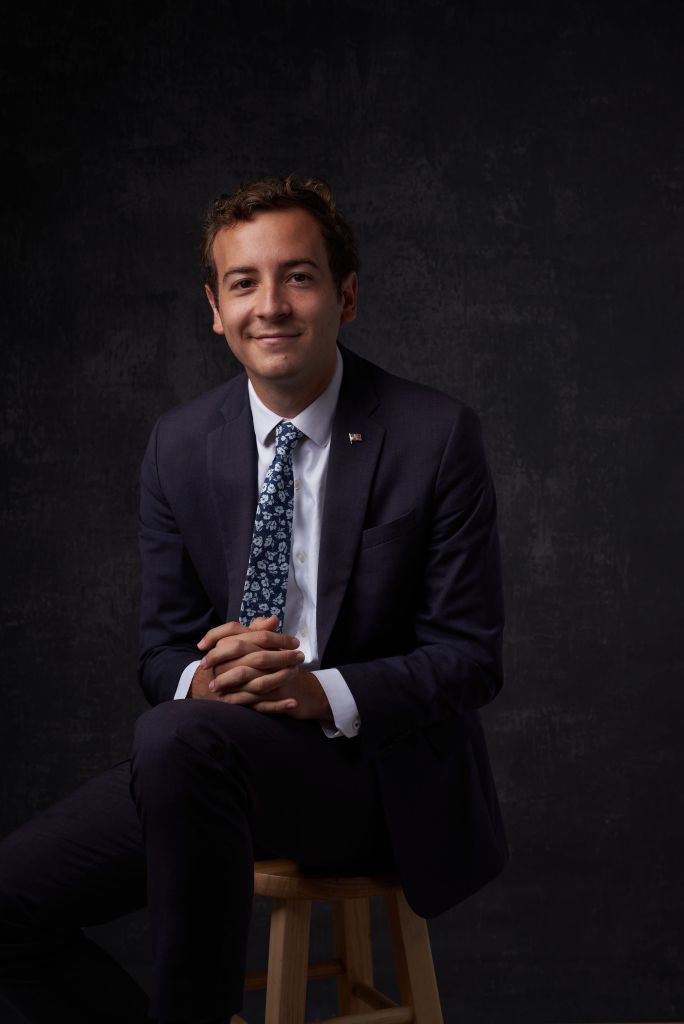Nicole Gerber was one of the first Westporters to be featured in the Westport in Focus series (her interview posted March 26, 2020). At that time, she had taken a step back from her role as co-director of AWARE CT. In October 2020 she began doing fundraising and development for Wakeman Town Farm. The Museum asked for her thoughts on the past year in quarantine and her work on the 2020 Presidential Election.

This has been a real journey for me. When this first started I had a positive outlook on the situation. I believed this was temporary. We’re all going to go into quarantine, we’re going to spend a few weeks sort of hunkering down, reevaluate our priorities, and emerge from this as a stronger, healthier, better community. A year later, after experiencing a full range of emotions related to the pandemic, I still believe that we’re going to come out of this in a better place than when we entered.
About seven weeks into quarantine, I started to become agitated and depressed. My outlook on the situation darkened. There were times when all I really wanted to do was run out of my house screaming and hug the first person I saw. I started speaking with a therapist for the first time in twenty years, and I learned how to lean into my amazing support system and friends. Like so many dog walks, Zoom happy hours, and virtual cooking dates became my way of connecting with friends and extended family. I also developed a deeper appreciation and affection for my neighbors because there have been times when they were the only people I saw for days and weeks on end.
The truth is that for us this last year has been a gift. I feel like we got a bonus year of very close time with our children who, at ages 14 and 12, would normally prefer to be with friends over family. For years my husband had an intense travel schedule for work, and we really only spent time with him on weekends. But this past year my husband and I got to spend real time together, we rediscovered each other, we worked on our marriage, and the kids got to know him on a deeper level. We’ve had some rough moments, but I wouldn’t change any of it. It was in those moments that we got to know each other, ourselves, and we grew as a family.
I’m hopeful that people have used this time to take stock of their lives and are being kinder and gentler towards each other. I am also hopeful that we are becoming more conscientious of our impact on the environment, and that we take real steps to heal our planet. Because I feel like this pandemic is the result of humanity being very abusive to our surroundings, environment and ourselves. It’s as if Mother Nature is saying to us as a whole, “You really need to rethink your value system and reevaluate how you are living your lives.”
As part of taking stock of my personal priorities and putting them into action, in October I started doing development and fundraising for Wakeman Town Farm. The Farm is an environmental education and sustainability center right here in Westport. Its mission is to educate adults and children in our community to live a cleaner, healthier, more sustainable lifestyle. So, I’m focusing my energy on making the Farm successful.
When we first entered quarantine, I was blown away by how many of our neighbors stepped up and volunteered to help people in need, collect PPE for first responders, and in general work together to make the best of a bad situation. What I love about Westport is that people continue to be there for each other. Pandemic fatigue hasn’t curbed our community spirit. I also think Jen Tooker and Jim Marpe have been phenomenal in leading us through this crisis. I appreciate how they’ve been communicating with residents, working closely with local merchants and restaurants, and supporting the schools. That’s been amazing.
At the risk of ruffling a few feathers, I do think we could have done better with ensuring our older children were social distancing, especially once the weather turned cooler and school started. There was a period of time that I was afraid to send my children to school because the daily number of cases coming out of the high school were high…too high! I get it. I’m a mom with children in high school and middle school. This has been very hard on our kids, but this is also a time for teaching our children about sacrifice and social responsibility. This has been an adjustment for all of us, and it breaks my heart to know that our children are essentially missing out on some of the most important school years of their lives.
I’m afraid that once we come out of this quarantine we will return to a version of our previously crazy lives. I don’t want to go back to feeling rushed and harried, or my kids feeling pressured to over-schedule their lives. But all in all, I think that Westport is going to come out of this a stronger and better community than when we entered it.
In 2020 Nicole was active with the Democratic National Committee. She served as a Poll Observer in Pennsylvania on Election Day and in Georgia (for the special election on January 5, 2021).
Danielle Dobin and Candace Banks organized the group that went to Pennsylvania. Through the DNC I trained as a Poll Observer and Voter Protection Officer. I was in Pennsylvania on Election Day. And then I was in Atlanta for the runoff elections.
I was there to make sure that basically nothing hinky happened at the polls, that every eligible voter had an opportunity to vote and to make sure that his or her vote counted on that day. Part of my job was to act as a check and balance to my Republican counterparts, who were also trained and performing the same function as I was, and to record whether or not they were observing state election laws. I also did ballot curing in Georgia, which was so important because I witnessed voter suppression.
There had been a spike in COVID cases across the country prompting my husband, who is incredibly supportive of what I do, to ask me to consider not going to Georgia. But it was important. So I got myself a N95 mask and a face shield and I quarantined when I came back.
My 12 year old son was really concerned about me going to Georgia because he was afraid that there was going to be violence and that something bad was going to happen to me. But there was nothing scary or dangerous that I saw in Georgia. People were so grateful that we were there.
The day I returned from Georgia was Wednesday the 6th– the day that the riots happened in the Capitol. The whole thing was so scary and surreal.
It was really hard to be away from my family, but it was 100% worth doing. I never doubted that I would be of use, or that my presence wouldn’t be impactful. I always knew that going there I was going to help make a difference.
It was really hard to be away from my family, but it was 100% worth doing.




